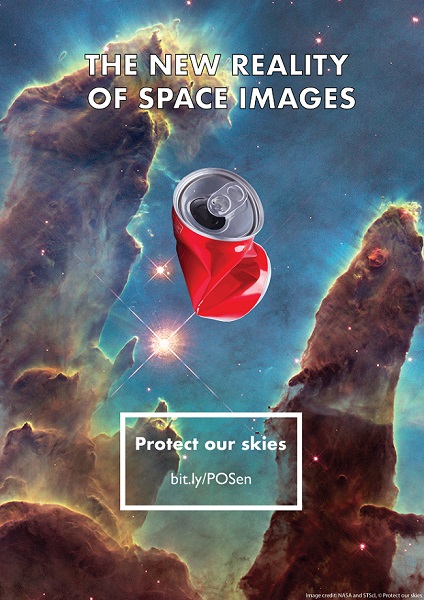Young astronomers draw attention to satellite pollution and space debris
Three young astronomers with PhDs who met in the Netherlands draw attention to light-polluting satellite networks and space debris. They have created a website with an interactive infographic and seven downloadable posters. Their campaign precedes the global Satcon2 conference in mid-July where astronomers and satellite builders discuss ways to reduce the interference of satellites.
Private telecommunications companies such as Starlink are rapidly launching satellites to enable Internet access in inaccessible places. Starlink now has a network of more than 1600 satellites around the earth and a license for 12,000. Amazon also wants to launch satellites and China has plans too. It is estimated that within ten years there will be between 50,000 and 100,000 new satellites orbiting the Earth. That is twenty times as much as now.
With the Protect our skies campaign, three young astronomers with PhDs are drawing attention to the harmful effects of the satellite networks. These are Kateryna Frantseva, astronomer at the University of Groningen, Jure Japelj (formerly University of Amsterdam, now a freelance science communicator) and Martha Irene Saladino (formerly Radboud University, now science communicator at Universidad Diego Portales in Chile).
The astronomers are concerned about the negative consequences of the satellites for astronomical research. The satellites disrupt the sensitive observations of astronomers and throw a spanner in the works for astrophotographers. Companies are now launching satellites that reflect less light, but that has not been good enough so far. In addition, the chance of collisions in space is increasing. As a result, weather satellites can fail and navigation systems and mobile phones work less well.
According to the astronomers, there should be two kinds of rules. The first set of rules is about what the satellites look like and that they don't reflect sunlight, for example. The second set of rules deals with the responsible handling of satellites and space debris. Satellite companies, for example, could relay the orbits of their satellites to astronomers so that they can turn away their sensitive cameras in time. And companies or countries that send satellites into the sky must also ensure that they are cleaned up properly.

More news
-
15 September 2025
Successful visit to the UG by Rector of Institut Teknologi Bandung
